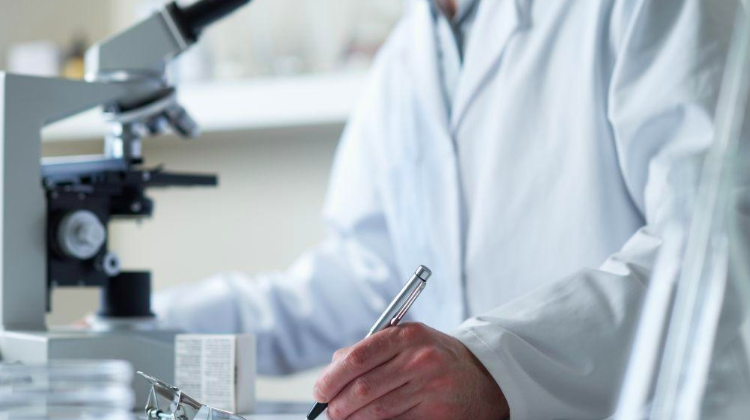Liposomal preparations - a hope for more effective treatment of cancer, including pancreatic cancer
 Photo: Fotolia
Photo: Fotolia
Researchers from Wrocław are working on liposomal preparations that will help deliver drugs in combination with natural bioactive substances from plants to cancer cells. Such solutions will help increase the effectiveness of therapies, for example for pancreatic cancer.
Thanks to this combination, a higher dose of these substances can be used than in the case of using only classic drugs in cancer therapy. This means that with a higher concentration and at the same time lower toxicity, we get a much better therapeutic effect, says Dr. Jerzy Gubernator, head of the Lipid and Liposome Department at the Faculty of Biotechnology of the University of Wrocław.
Wrocław researchers are looking for new drugs particularly for pancreatic cancer. They have developed a liposome form of epirubicin - a classic anti-cancer drug, as well as liposomal preparations containing curcumin and berberine. The results of animal tests show that these liposomal substances are more effective. "The administration of these liposomal substances significantly increases the effectiveness of therapy compared to free substances" - the scientist emphasises.
Liposomes are small lipid vesicles composed mostly of phospholipids. They can be the size of bacteria or viruses. Researchers use virus-sized liposomes in cancer research. These small particles can get to the place where, for example, inflammation is present (which often also accompanies cancer) - and accumulate there.
"Due to the fact that liposomes are so small, we can obtain the effect of their accumulation in cancer tissue. And because the blood vessels in tumours have greater permeability, a greater therapeutic effect is also obtained" - he explains.
Liposomes remain in the bloodstream for a long time - for some types the half-life in blood circulation is up to 50 hours. Therefore, even one week after administration of liposomes, some of them are still circulating in the bloodstream and can accumulate in cancerous tissue.
According to Dr Gubernator, scientists primarily work on the combination of different substances that have a broad therapeutic spectrum or different mechanisms of action. This gives the prospect of more effective treatment.
Scientists often use classic anticancer drugs in combination with natural bioactive substances of plant origin. Many substances found in vegetables or spices, eaten daily, have strong anti-cancer properties. Examples include curcumin (one of the substances found in turmeric), or compounds present in cruciferous plants, such as cabbage.
"If we tie them together with a liposomal carrier and use with an anticancer drug, then this therapeutic effect can be very clearly strengthened. It is also important that natural substances often have greater selectivity towards cancer cells than traditional chemotherapeutics" - the expert says.
The development of methods for the release of substances from liposomes is also crucial. "We are working on making the substances enclosed in liposomes work in different ways, and secondly, on achieving their controlled release. The goal is to achieve the highest possible concentration of therapeutic substances in the tumour, which allows for an effective therapy" - explains the researcher.
Researchers from the Lipid and Liposome Department of the University of Wrocław are primarily looking for new possibilities of pancreatic cancer treatment. This is one of the most difficult to treat cancers. Mortality rate associated with it is very high, and the average survival time of patients is only 9-10 months.
The research starts with the selection of substances to be enclosed in liposomes. "We select, screen various substances that could be used in pancreatic cancer. We study both classical chemotherapeutics and natural substances. Then we make combinations of these substances, we study the synergy effect. When we obtain it, we add another substance in order to further increase this effect. This way we can lead to killing 98-99 percent of cancer cells" - says Dr. Jerzy Gubernator.
After conducting in vitro tests on cell cultures, scientists prepare liposome versions of these substances, which are then tested on animals, especially on mice. They have developed liposomal preparations containing curcumin and berberine - natural plant substances that can be used to treat pancreatic cancer, as well as a liposomal form of epirubicin, a classic anti-cancer drug.
Speaking about the first results of these studies, Dr. Gubernator admits that the administration of such liposomal substances clearly increases the effectiveness of therapy in comparison with free substances.
"If, for example, we compare an animal treated with drugs in both free and liposomal form, this effect is several times greater. The survival rate of animals is greater and tumours develop many times slower. The effect of accumulation and then controlled release of these substances is actually visible and positive" - emphasises the scientist.
If animal tests are ultimately successful, clinical trials will need to be carried out. This, however, is a long and expensive path, concludes Dr. Jerzy Gubernator from the University of Wrocław.
PAP - Science in Poland, Kamil Szubański
szu/ zan/ kap/
tr. RL
Przed dodaniem komentarza prosimy o zapoznanie z Regulaminem forum serwisu Nauka w Polsce.















